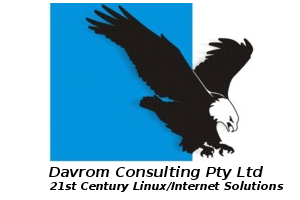





Back to Newsletters KEYWORDS= Davrom Consulting Newsletter - Issue # 49 - Dated: 25 Jul 2011 From the desk of David Clark Davrom has reached its 10 year mark having started trading in June 2001. Support life marches on into the years and I take heart to hear more people trying out Linux on their desktop albeit in a virtual environment using products like VirtualBox to run it on their Windows/Mac desktop. Ubuntu is a big favourite out there but I have plugged into the Linux that is third/fourth place in popularity, that being Fedora. As I first started out with the free versions of RedHat many years ago moving onto Fedora/CentOS was the easiest progression, and being modeled on RedHat itself (which would be the largest provider of commercial grade Linux) my desktop work environment continues as it always has without a hiccup or change since 2000/2001. I must also mention that the Linux operating system has now turned 20 years old and I have been watching the various industry events around the world celebrating this milestone. Thank you Linus Torvalds for pioneering this robust and greatly affordable version of UNIX. I seem to have moved heavily into text to PDF forms document merging and creation so much so I have developed a Linux solution called "davrompdf" that is to provide a generic program that performs the document creation magic. There have been a few requirements to take the old text print jobs from SCO and non-SCO boxes and put them onto Linux and give the applications new life with modern new looking forms for printing and e-mailing. Customers of Davrom who have been receiving invoices since July 1st this year will already be receiving our own invoices in PDF format. Davrom has started installing Cyeberoam devices over the past few months and I have been pleasently surprised at this alternative to SnapGear for Internet firewall/routing. All in all, there is always something to do in in I.T - busy busy. I would like to thank the reader for their time in reading this newsletter. David.M.Clark UNIX Quote Linux is yet another example of a robust operating system that can and will outlive the hardware it currently runs on. Cyberoam With the demise (or kiss of death) given to the SnapGear range that Davrom has sold for many years, it was vital to find another well rounded Internet gateway/firewall/router that we could offer customers who are looking to do things such as connected branch offices to each other (IPSec) and enable remote VPN access for staff. Like the SnapGear range, the Cyberoam still requires a modem in front of it acting in bridge mode for ADSL, or running as a DHCP connection with the Cyberoam being the device behind the modem (ADSL/cable modem). The base range unit, the Cyberoam CR15i is an excellent unit and sits in the same position as the SnapGear SG300 used to. Cyberoams require substantially more steps to setup but the configuration is so well fine tuned (eg firewall rules and virtual hosts), it is worth the extra effort. Their internal diagnostics to test firewall rules is second to none and has helped enormously to diagnose and fine tune the Cyberoams we have in the field to date. There is an on-line virtual setup on the Cyberoam website that lets you become familiar with their configuration interface, just go to http://www.cyberoam.com and click on their Live UTM Demo link. Cyberoams are distributed here in Australia by MPA Systems. From the Trenches Some comic or not so comic relief from the support days gone by. Too many UNIX people in one room. In 1991 I attended a UNIX train-the-trainer course held in Sydney provided by our employer to allow us to train customers in our respective states. It wasn't long before yours truly and the rest of the class embarked on network assination of each other's fully operational UNIX systems. Random reboots and console screens changing colour to flashing magenta on white background were the order of the day. It was interesting to observe the different levels of UNIX skills class members possessed as we fought a quiet battle from time to time to kill or be killed. Needless to say this wasn't the occupation of the entire time in the class as we were to be assessed on our abilities - shame the ability to hack someone else's machine wasn't an automatic pass. Tech Tip Using the hashpling. If you write shell programs it is well worth using the hashpling at the top of your program to enforce the shell environment you wish the program to run inside of. For example, to ensure a shell program runs in Bourne shell, the very first line in your script program would be: #!/bin/sh The hashpling tells the script where to find the actual shell environment executable program. To make sure your script executes using Perl, you would set the hashpling to: #!/usr/bin/perl or depending on your version of UNIX/Linux and location of Perl binary, possibly: #!/usr/local/bin/perl Back to Newsletters 





Website design by Davrom Consulting Pty Ltd This site is fully tested with Google Chrome and Firefox web bowsers Home Page | Support | Misc | David's Pages | Podcasts | Contact Us | Blog |
